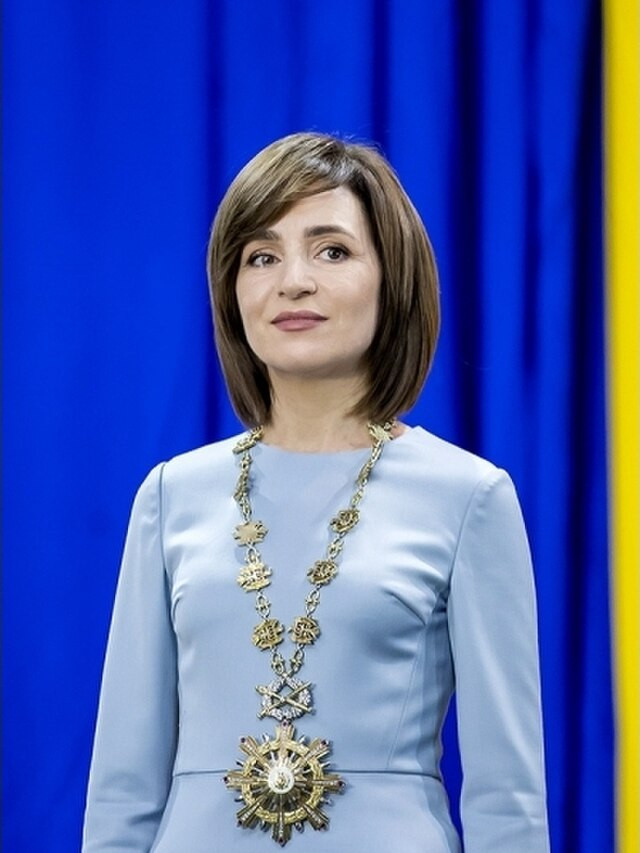European leaders rallied behind Moldova's pro-Western President Maia Sandu following her decisive victory in the country's presidential election, seen as a critical step toward Moldova's EU integration. Sandu, who won 55.4% of the vote against her Russia-backed rival Alexandr Stoianoglo, emphasized Moldova's commitment to "democracy and a dignified future" in a statement posted on X, thanking her supporters both at home and abroad.
"Moldova, today you are victorious," Sandu wrote. "Together, we've shown the strength of our unity, democracy, and commitment to a dignified future. Thank you, dear Moldovans, at home and abroad. Walk with pride-you are freedom, hope, and resilience." Sandu's support from the Moldovan diaspora, with over 300,000 votes cast from abroad, significantly boosted her lead.
In congratulatory statements, European leaders hailed Sandu's win as a triumph for democracy and a setback for Russian influence in Eastern Europe. German Chancellor Olaf Scholz commended Sandu for "setting the country on a European course," while French President Emmanuel Macron celebrated the victory, saying, "democracy has triumphed against all interference." Ursula von der Leyen, president of the European Commission, praised Sandu's "rare kind of strength" in overcoming obstacles in the election process, pledging continued EU support for Moldova.
The election occurred amid heightened tensions over Russian interference in the voting process, as Germany condemned "a massive, coordinated attempt" to obstruct Moldovan voters overseas. German Foreign Minister Annalena Baerbock cited bomb threats targeting polling stations in German cities, including Hamburg and Berlin, which she described as an attack on "the heart of European democracy." Moldova's foreign ministry confirmed similar incidents, noting that polling sites in the UK had also been targeted.
Allegations of Russian meddling have become a recurring issue in Moldova's elections. Moldovan authorities reported attempts at vote-buying, cyber-attacks on polling stations, and intimidation of voters in the run-up to both the presidential election and a referendum last month, which narrowly supported EU membership as a constitutional priority. Stoianoglo, Sandu's opponent, has strong ties to the pro-Russia Party of Socialists and was quick to denounce Sandu as "an illegitimate president."
In a joint statement, the European Commission and EU foreign policy chief Josep Borrell condemned "unprecedented interference by Russia" in Moldova's elections. The statement criticized Russia's "hybrid attempts" to sway Moldovan voters, including disinformation campaigns and vote-buying schemes aimed at undermining Moldova's democratic process. Borrell and von der Leyen emphasized the EU's commitment to Moldova's aspirations, with the EU offering a €1.8 billion growth plan aimed at doubling Moldova's economy in the next decade.
Ukrainian President Volodymyr Zelensky also voiced his support, stating, "Moldovans have made a clear choice - they chose a path toward economic growth and social stability." Zelensky, whose country shares Moldova's ambition for EU membership, expressed hope for a united, peaceful Europe, adding that Ukraine would support Moldova's European path.
The Kremlin, however, firmly denied any involvement. Russian government spokesperson Dmitry Peskov stated, "We resolutely reject any accusations that we are somehow interfering in this. We are not doing this." Andrei Klishas, a member of Russia's Federation Council and a prominent ally of President Vladimir Putin, accused Western governments of manipulating the election, claiming that votes from foreign polling stations were "brought in" to secure Sandu's victory.
Sandwiched between Ukraine and Romania, Moldova has long been a strategic interest for Russia, which seeks to maintain influence over its former Soviet neighbors. Following Russia's 2022 invasion of Ukraine, Moldova, along with Ukraine, applied for EU membership in March of that year. Both nations were granted EU candidate status three months later as the bloc accelerated integration efforts for countries under pressure from Moscow.
Despite its small size and largely agrarian economy, Moldova's geopolitical positioning has made it a focal point for EU leaders who see the country as vital to securing Europe's eastern flank. Moldova's bid for EU membership received additional support last month when the European Parliament proposed financial aid and reforms to help Moldova modernize and prepare for eventual accession. Romanian MEP Siegfried Mureșan, a key advocate for the growth plan, called Sandu's win "a victory for the citizens of the Republic of Moldova and a defeat for the Russian Federation."
Sandu's victory drew immediate praise from European leaders, but one conspicuous absence from the congratulatory chorus was Hungarian Prime Minister Viktor Orbán. The pro-Russian Orbán has been at odds with EU policies and was recently criticized for offering early support to Georgia's pro-Russian ruling party before the official results in that election had been confirmed. Orbán's silence highlights the split within the EU regarding relations with Russia.
Polish Prime Minister Donald Tusk weighed in with a veiled reference to the upcoming U.S. election. "Despite Russia's aggressive and massive interference in the Moldovan presidential elections, Maia Sandu most likely defeated Moscow's favourite," Tusk wrote on X. "Let's hope that this trend will continue in the coming days and months in other countries as well."




